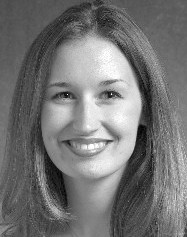
We must always question
Andrea Menendez will deliver this speech at the Phi Beta Kappa initiation:
In spite of the relative comfort afforded us by this beautiful campus, we are clearly living in uncomfortable times. Throughout our years at SMU, we have suffered the tragedy of Sept. 11, we have felt the effects of corporate scandal, and we have seen our nation wage war in the Middle East.
Some days I felt so downtrodden that I could hardly focus on my schoolwork. How petty does writing a paper on Emerson and Melville seem when people in other parts of the world are dying? After class one day this semester, noting how distressed I seemed (and the fact that I had not done my homework), Professor Dayna Oscherwitz approached me to talk about the week’s events. “How can I sit at home and write a paper?” I asked, my eyes welling with tears. I almost felt guilty for being able to lead a normal life. Her reply prompted the essence of my speech tonight. She told me that if anything, the events we’ve witnessed demonstrate the immense importance of education. In my case, it’s both a privilege and a responsibility to learn how to deconstruct literature. It has changed the way I think. It has changed the way I understand and approach the world.
Tonight we recognize the fact that each of you clearly values your education. Your education, however, transcends the lecture hall, the reading assignment, the 3 a.m. rush to finish up a paper, the cumulative GPA. The analytical skills you’ve developed at SMU are not simply intended to aid you in your future vocation. The professors here, many of whom I’ve grown to cherish, recognize this. In fact, it’s the reason that many of them went into teaching. Dr. Foster of the English department recently told me that he became an English professor because he felt it was important to show people a different way of thinking, and I would like to think that I testify to his success.
I cannot help but apply the skepticism I’ve learned in the classroom to the world around me. I challenge you to do the same. Question. Doubt. Let your ears accept nothing that your mind does not challenge. As Adrienne Rich put it, “Be insatiable.”
And so I give you the top 10 reasons to be a skeptic.
1. If we fancy ourselves responsible humans, then humanity is our cause, and we must endeavor to know it in rugged honesty.
2. Existence is filled with the clamor of rhetoric.
3. This rhetoric covers the world, shapes the world and is part of the world. It has accomplished mighty and terrible things.
4. This makes for a messy situation. Choices are made. Consequences unknown. Lives hang in the balance.
5. But, as Elizabeth Bishop has said, “our knowledge is historical.” Our first line of questioning, then, must be historical.
6. History is filtered through many lenses. Thus, history wears many faces; each must be questioned. Verdicts are unstable.
7. Understanding is not sifting through, but swimming in the stew of assertions, language and artifacts. To understand, we must embrace complexity. And we must get at the underside of things.
8. Lives hang in the balance.
9. My husband has often remarked that if you say anything with enough conviction, people will take it for truth. Try it sometime. The experience is illuminating.
10. Lives hang in the balance.
We must always question. When we read a book or an annual earnings report, when we attend a lecture or watch the news. Because we prefer the rational, we often want every question mark to be complemented by a period, but seldom will our questions produce easy answers. We should not fear the lone question mark. If it suggests an almost overwhelming complexity in the world, it is also suggests the power of the individual-each of us has radical potential.
Though critics, we cannot forget that we are within the world, not without it. None of us are objective or unbiased; we are part of our own study, fragments of this thing called humanity. We must partake in it. Therefore, our role is a dual one: we are observers and participators. In Henry James’s story Daisy Miller, the protagonist’s propensity for “cautious criticism” prevents him from making a move, and in the end he loses the girl. I contend that we are to be both cautious critics and active voices.
I am continually awed by some of the students on this campus who are brave enough to go against the grain. They both inspire and implicate me. If we are to be responsible, we must be brave. We must face the uncertainty with critical confidence, realizing that our words and actions are potentially as influential as those of the leaders of nations. We cannot abstain, we must engage. This speech, for me, represents an effort to engage.
Challenges are very rarely comfortable. They frequently require us to cast off the familiar. But we have had the benefit of an extraordinary education. We are without excuse. I hope it has become clear that as our era begins to take shape, I do not intend to sit idly on the sidelines, however comfortable they may be. I hope you will join me on the field.








